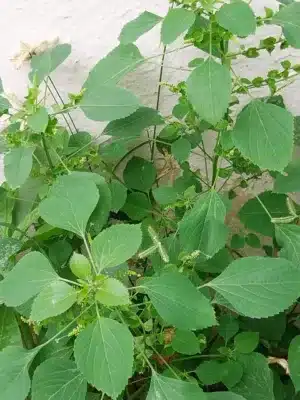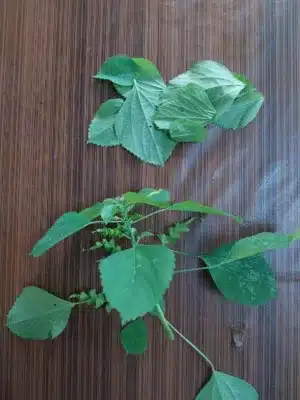Indian Nettle or Acalypha indica Exploring the Origin and Global Presence - The Natural and Medicinal Heritage of Indian Nettle
In Tamil it is known as Kuppaimeni and in Hindi kuppikhokhali (खोखली या हरिता मंजरी)

Table of Contents
Origin
Acalypha indica, commonly known as Indian Nettle or Indian Copperleaf, is native to the Indian subcontinent. Its natural range extends across South Asia, including countries such as India, Sri Lanka, Bangladesh, and Pakistan. The plant is well adapted to tropical and subtropical regions, where it can be found growing in a variety of habitats, including open fields, waste areas, and along roadsides.
Due to its hardiness and adaptability, Indian Nettle has also been introduced to and naturalized in other parts of the world with suitable climates. It can be found in regions of Southeast Asia, Africa, and the Americas. The plant has become widespread in some tropical and subtropical areas, where it may thrive in diverse environmental conditions.
Acalypha indica is a member of the Euphorbiaceae family, which includes a variety of plants with diverse forms and uses. In its native and introduced regions, Acalypha indica is known for its traditional medicinal uses and is used in various herbal remedies in different cultures.

Nutrients
Indian Nettle may contain the following nutrients and bioactive compounds:
Vitamins: Acalypha indica may contain vitamins such as vitamin C, vitamin A, and various B vitamins. It helps to boost our all health and also supports our body functions smoothly.
Minerals: The plant may contain minerals like calcium, potassium, iron, and magnesium. These minerals are crucial for bone health, muscle function, and overall well-being.
Phytochemicals: Indian Nettle is rich in phytochemicals, including flavonoids, alkaloids, and tannins. These compounds have It stress.
Proteins and Amino Acids: The plant may contain proteins and essential amino acids, contributing to its nutritional value.
Fiber: Indian Nettle may provide dietary fiber, which is important for digestive health and can help regulate bowel movements.
Bioactive Compounds: Some studies suggest that Acalypha indica possesses bioactive compounds with potential medicinal properties, including anti-inflammatory and antimicrobial effects.
It’s important to note that while Acalypha indica has been traditionally used in herbal medicine, scientific research on its nutritional content and health benefits is ongoing. If you are considering using Acalypha indica for medicinal purposes, it’s advisable to consult with a healthcare professional to ensure it is safe and appropriate for your specific health needs.
Please keep in mind that information about specific nutrient content can vary based on factors such as soil conditions, growing environment, and plant maturity.

Health Benefits
Health Benefits
Anti-Inflammatory Properties: Indian Nettle contains bioactive compounds with anti-inflammatory properties and helps to reduce e inflammation in your body which also has connction with various chronic conditions.
Antimicrobial Activity: Some studies suggest that Acalypha indica exhibits antimicrobial properties, indicating its potential to inhibit the growth of certain microorganisms. This property may be beneficial in addressing infections
Antioxidant Effects: The plant contains antioxidants, including flavonoids and other phytochemicals. Antioxidants it helps free radicals in the body, it lower oxidative which lowers the risk of any heart related diseases.
Digestive Health: Indian Nettle may contribute to digestive health due to its dietary fiber content. Fiber supports healthy digestion, regulates bowel movements, and may help prevent constipation.
Wound Healing: Traditional uses of Acalypha indica include its application on wounds and skin conditions. The plant’s potential antimicrobial and anti-inflammatory properties may contribute to the healing process.
Respiratory Health: In traditional medicine, Indian nettle has been used to address respiratory issues. It is believed to have bronchodilator effects, potentially helping to alleviate symptoms of respiratory conditions.
Anti-Diabetic Effects: Some studies suggest that Indian nettle may have hypoglycemic (blood sugar-lowering) effects. This could be beneficial for individuals managing diabetes, but more research is needed in this area.
Pain Relief: The anti-inflammatory properties of Acalypha indica may contribute to its potential as a pain reliever, particularly for conditions involving inflammation.
Anthelmintic Properties: Indian nettle is believed to possess anthelmintic properties, meaning it may have the ability to expel or destroy parasitic worms, offering potential benefits for gastrointestinal health.
Anti-Bacterial Effects: The plant has been studied for its potential anti-bacterial properties, suggesting it may help combat certain bacterial infections.
Anti-Cancer Properties: Some studies indicate that Acalypha indica may exhibit anti-cancer effects, although more research is needed to understand its mechanisms and potential applications in cancer treatment.
Anti-Diabetic Activity: Acalypha indica has been explored for its potential in managing diabetes, with reported anti-diabetic effects that could be beneficial for individuals with diabetes.
Anti-Hyperlipidemic Effects: The plant may have anti-hyperlipidemic properties, meaning it could potentially help regulate lipid levels in the blood, offering benefits for cardiovascular health.
Anti-Obesity Effects: Acalypha indica has been studied for its potential anti-obesity effects, suggesting it may play a role in weight management.
Anti-Venom Properties: Some literature studies suggest that Acalypha indica may have anti-venom properties, potentially assisting in the treatment of venomous snake bites.
Hepatoprotective Effects: Acalypha indica is reported to have hepatoprotective properties, meaning it may help protect the liver from damage and support its overall health.
Hypoxia Relief: The plant has been investigated for its potential to alleviate hypoxia, a condition characterized by a deficiency of oxygen in the body.
Wound Healing Properties: Acalypha indica is traditionally used for wound healing, and scientific studies support its potential in promoting the healing process.
It’s important to note that while these potential health benefits are mentioned in the literature, further research is essential to establish the efficacy, safety, and specific applications of Indian Nettle for various health conditions. Individuals considering the use of Acalypha indica for medicinal purposes should consult with healthcare professionals for personalized advice.


Rceipe
Indian Nettle Stir-Fry Recipe
Ingredients:
100 grams Indian Nettle leaves
1 onion or 15 to 20 shallots, finely chopped
3 to 4 red or green chilies, chopped
Turmeric powder, salt to taste
Grated coconut
Oil of your choice
Instructions:
Pluck only the leaves of the Indian Nettle, avoiding the branches and any smaller leaves with flower pods (refer to the second image).
Heat a pan with a spoon or two with oil over medium heat. Add mustard seeds and let them splutter.
Add chopped chilies and onions/shallots to the pan. Fry until the onions/shallots turn light brown.
Introduce the Indian Nettle leaves to the pan, along with a pinch of turmeric powder and salt to taste.
Pour ¼ cup of water into the pan and cook until all the water evaporates.
Turn off the stove and add 2 to 3 tablespoons of grated coconut. Mix well.
Serve the stir-fry with rotis or rice. For an extra delightful touch, enjoy it with rice topped with a spoonful of butter. savor the flavors!
